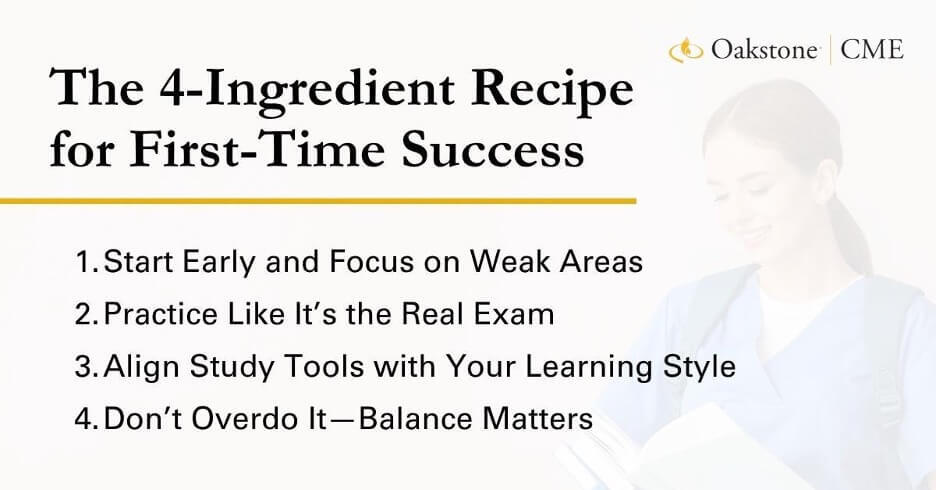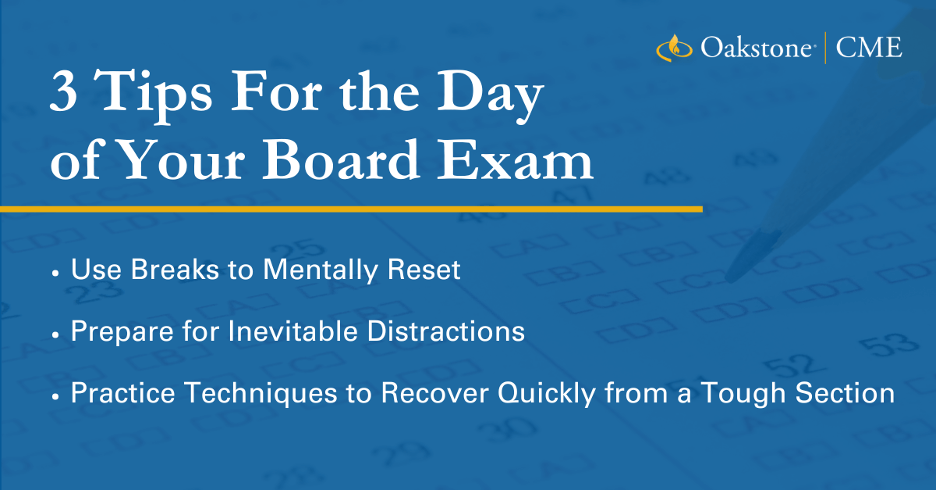How to Avoid Failing Medical Boards on Your First Attempt

Each year, thousands of physicians sit for the most consequential test of their medical careers—and thousands don’t pass. According to the American Board of Internal Medicine, the first-time pass rate for the Internal Medicine Certification Examination has declined to 87% in recent years, meaning more than 1 in 10 candidates fail on their first attempt.
The implications of failing medical boards go well beyond a retake. It can delay certification, impact credentialing, limit hospital privileges, and jeopardize employment offers. For busy physicians, it’s not just a setback—it’s a ripple effect with real professional and personal consequences.
To help you avoid that outcome, Dr. Laura Rachal, a quadruple board-certified physician and medical educator, shares practical, evidence-based strategies to strengthen your prep, stay composed under pressure, and pass your medical board exam the first time.
Why First-Time Pass Rates Matter
A failed medical board exam isn’t just a temporary setback—it can limit your ability to practice, affect your job security, and force you into a compressed, high-pressure timeline for retesting. While every specialty board has different rules, most specialties require physicians to become board-certified within three to five years, with strict retake limits.
“You’re only allowed to attempt your boards three times within three years, and then you actually have to wait a year,” explained Dr. Laura Rachal. “And again, this is very different for a variety of different specialties.”
Failing medical board exams can also complicate credentialing. Many hospital systems and state licensing boards require board certification to grant privileges, particularly after the first year of practice. In some surgical specialties, failing oral boards may limit procedural scope—even post-fellowship.
For early-career physicians juggling job transitions, relocations, or family demands, the pressure is intense. Your board prep needs to be intentional, practical, and built to support success on the first attempt.
Common Mistakes That Lead to Failing Medical Boards
Even the most capable physicians can fail their medical board exam if their prep is inconsistent or misaligned. These common missteps can quietly derail your progress:
Unrealistic Study Schedules
When your study plan doesn’t match your workload, you’re setting yourself up to fall behind. “Don’t try and give yourself 40 hours a week of questions whenever you’re doing 80 hours a week of work—it’s just not going to happen,” said Dr. Rachal. Create a study schedule that accounts for your actual time and energy. Use lighter rotations to ramp up, and scale back during intense weeks—without abandoning balance. If you're overwhelmed, recalibrate rather than pushing through an unmanageable plan.
Procrastination
One of the most common and damaging mistakes is simply waiting too long to start. Dr. Rachal pointed out that many physicians underestimate how long they’ll need—or overestimate future motivation. Creating structure early is critical. Use in-service exam results to guide your content focus or check in weekly with a study partner to stay accountable.
Studying Only What Feels Good
Avoid the comfort zone. Focusing only on strengths leaves critical gaps. “Only focusing on topics or starting with topics that [you] feel most confident in” is a red flag, said Dr. Rachal. She recommends the “sandwich method”: begin with a familiar topic, tackle a tough one, then finish with a strength to build momentum and confidence.
Struggling to Start
On tough days, just beginning can feel overwhelming. Dr. Rachal’s advice: keep it small. “Read a paragraph, do 10 practice questions,” she said. “You’d be surprised, because after you did the 10 questions, you’re like, man, I could do that. Well, let me do another 10 and read another paragraph.” That momentum builds quickly and soon, you’ve knocked out an entire section.
The 4 Keys to Passing Your Medical Board Exam on the First Try
Passing your boards on the first attempt isn’t about cramming—it’s about intentional, sustainable prep. Here’s how to build a plan that maximizes retention, confidence, and performance under pressure.
Start Early and Focus on Weak Areas
Dr. Rachal recommends starting your prep six to nine months before the exam, with an early focus on the areas where you’re least confident. “You're supposed to be in that specialty,” she said. “You are absolutely capable of passing.” But that means identifying your gaps using tools like in-service exams and targeting them with discipline.
Practice Like It’s the Real Exam
Once you’ve covered foundational knowledge, shift toward test-style practice. Dr. Rachal encourages learners to simulate exam conditions with full 50-question timed sets. This builds the stamina and strategy you’ll need to avoid failing your medical board exam under pressure.
Align Study Tools with Your Learning Style
Dr. Rachal emphasizes the importance of adult learners knowing what learning style works best for them. “Using a technique that does not work to go through a ton of knowledge is not very efficacious at all,” she said. Whether you retain best through visual content, audio, or hands-on practice, find study tools that support your learning style. For example, Oakstone’s board prep tools offer video content for visual learners and audio companions like the ACP MKSAP Audio Companion for on-the-go reinforcement.
Don’t Overdo It—Balance Matters
You may feel pressure to use every spare minute to study, but overcommitting leads to burnout. Dr. Rachal advises physicians to aim for balance, “If you have 40 hours a week of off time, use half that time to study and the other half to do something for yourself that makes you human.” Sustained effort, not desperation sprints, builds lasting retention and improves your chances of passing your medical boards the first time.

Exam Day Resilience: 3 Tips to Stay Focused
Even well-prepared physicians can stumble on test day without the right mindset. Here’s how test takers can stay grounded and avoid failing a board exam:
Use Breaks to Mentally Reset
Dr. Rachal strongly encourages taking breaks—especially the longer ones. “It is always better to do some kind of kinetic activity in between exam sections,” she said. If you have time, leave the building and get outside.
She also recommends visual grounding exercises during breaks. Try forcing your brain to name what you see. “If it is a tree, if it is a bird, etc., it’s kind of a visual meditation practice… try and move your mind away from the exam.” Doing so can help you calm down—preserving focus for the next round of questions.
Prepare for Inevitable Distractions
Testing centers aren’t always quiet or predictable. “There will be distractions that happen on the day of the test,” Dr. Rachal warned. If something major occurs like a fire alarm or extended disruption, Dr. Rachal encourages people “to just directly communicate with the board and with the exam center directly.” But smaller distractions will happen too.
Plan ahead for environmental stressors: bring earplugs, dress in layers to adjust for temperature swings, and do a few practice blocks in mildly noisy environments to build focus.
Recover Quickly from a Tough Section
Maybe you just bombed a block. Dr. Rachal’s advice? Change the channel. “Focusing on all the questions you missed… is not going to help you get through your next set of questions. It’s definitely gonna psych you out in a way that you don’t want it to.”
If you’re having a mid-test meltdown, redirect your attention to something else: “Think about what you’re going to do after you take this test, and think about all of the great things that you’ve done so far in your career as a physician.” That reset—mental and physical—can help you start the next section clear-headed.

If You Do Fail: What to Do Next
A failed medical board exam doesn’t mean you’re unfit for medicine—but it does havel consequences. What happens if you fail your medical board exam depends on your specialty and your current role. In many cases, a failed attempt may delay certification, affect hospital credentialing, or impact employment contracts.
Dr. Rachal urges physicians to approach failure with both realism and self-compassion. “It is very important whenever you have gone through a position where you have failed your boards… to rebuild that confidence that you’re supposed to be in that specialty,” she said. “These boards are something that you are absolutely capable of passing.”
Many physicians who eventually pass cite the same turning point: finally setting aside protected time to prepare. Dr. Rachal encourages those who failed the exam to pause, regroup, and ask for help. “If it really is affecting your ability to work, asking for time off is also incredibly important in this period, because you want to be able to process the emotions that you’re having regarding it.”
You’re not alone if you’ve failed your medical board exam. You’re not the first—and you won’t be the last. But you can take control of what comes next.
Avoid Failing Medical Boards with the Right Prep
Passing your medical board exam on the first try isn’t about perfection—it’s about preparation, strategy, and self-awareness. The key to avoiding failing medical boards is starting early with the right tools and mindset.
Oakstone’s board prep solutions are designed for busy physicians, offering expert-led content in flexible formats. From specialty-specific reviews to high-yield audio like the ACP MKSAP Audio Companion and on-demand video, you can build a plan that fits your schedule—and sets you up to succeed.
Explore Oakstone’s board review options and start preparing with purpose.
